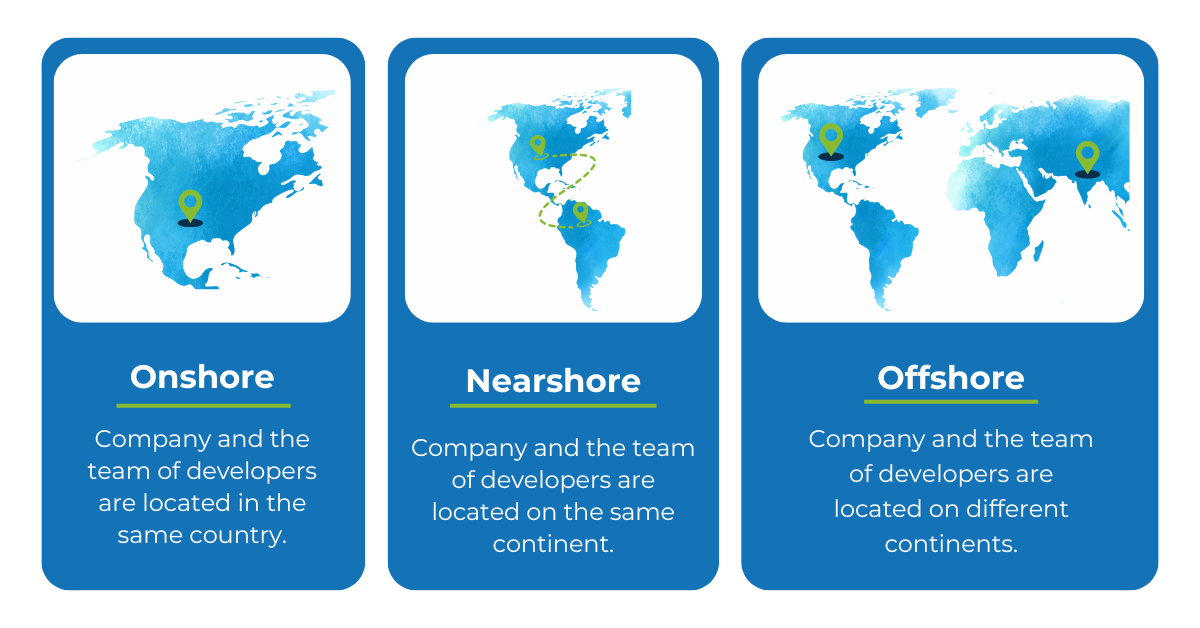In today’s fast-changing technology landscape, businesses constantly look for new ways to improve their software development capabilities. Nearshore software development is a popular and effective strategy. This approach strikes a good mix between cost, quality, and convenience, making it an appealing alternative for software developers and technology leaders in small to medium-sized enterprises (SMBs).
This post will demystify nearshore software development by looking at its core characteristics and benefits, and how to correctly apply them in your organization.
What is Nearshore Software Development?
Nearshore software development is the practice of outsourcing software development work to organizations or teams situated in physically close nations, usually within the same or similar time zones. This concept differs from offshore outsourcing, which entails working with teams in other countries, and onshore development, which refers to outsourcing within the country.
The essence of nearshore development is its ability to combine the cost-effectiveness of outsourcing with the convenience of geographic proximity. Being so close allows for better alignment in working hours, resulting in improved communication and collaboration between the client and the service provider.

What Are the Features of the Nearshore Software Development Model?
Nearshore outsourcing is a critical strategy for enterprises in pursuing efficient, cost-effective, and culturally compatible software development solutions. This section looks into the nearshore development services paradigm’s unique characteristics, emphasizing its strategic benefits.
Small Time Zone Differences
One of the distinguishing characteristics of nearshore development is the slight (or non-existent) time zone difference between the client and the service provider. This alignment enables real-time communication and cooperation, making it easier to resolve challenges, make choices, and keep projects moving.
Close Geographic Proximity
Geographic proximity permits quicker travel and in-person meetings and fosters a stronger sense of cooperation and collaboration. This is especially useful for projects requiring frequent interaction or complex integration with current systems.
Lack of Cultural Differences
Nearshore countries tend to have cultural similarities with their clients, reducing misunderstandings and simplifying the integration of outsourced teams into existing corporate cultures. This can improve teamwork and lead to more efficient project execution.
How Does the Nearshore Model Work?
The nearshore approach typically involves a client organization collaborating with a nearshore software development firm to complete specific software projects or activities.
Identification of Project Needs
The journey begins when the client business conducts a detailed review of its software development requirements. This includes determining the exact project goals, technical needs, deadlines, and budget limits. Understanding these elements is critical for selecting a nearshore partner whose experience and capabilities match the project’s requirements.
Choice of a Nearshore Partner
With project criteria established, the search for the ideal nearshore software development firm begins. This entails assessing possible partners based on their technical expertise, experience with similar projects, language abilities, and knowledge of the client’s market.
The firm’s reputation, client testimonials, and case studies are all important considerations during the hiring process. This phase may include RFPs (Requests for Proposals), interviews, and conversations to see whether the client and the nearshore firm are compatible.
Planning and Scope Definition
After selecting a partner, the next stage is extensive planning and scope defining. This phase requires joint efforts to rigorously delineate the project’s scope, establish defined objectives, and specify critical deliverables. Effective planning also includes establishing project timetables, milestones, and budget allocations. A comprehensive project plan acts as a road map, guiding all subsequent development operations and ensuring that both parties understand the project’s trajectory.
Development and Implementation
With the blueprint in place, the nearshore team begins the development process. The development process uses agile approaches to be iterative, allowing for flexibility and continuous feedback-based changes. During this phase, regular sprint meetings, progress reviews, and status reports are critical for keeping the project on track and achieving the client’s expectations.
Ongoing Communication and Collaboration
The nearshore concept is distinguished by its emphasis on continual communication and collaboration. Video conferencing, instant messaging, and project management software enable smooth communication between the client business and the nearshore staff. This ongoing communication is crucial for handling issues, making timely choices, and ensuring the project adjusts to changing requirements.
Quality Assurance and Testing
Concurrent with development efforts, quality assurance (QA) and testing are performed to guarantee that the software satisfies the highest quality and functionality criteria. This comprises a variety of testing approaches, from unit and integration testing to user acceptability testing (UAT), to discover and resolve any issues before final deployment.
Deployment and Support
After successful testing and client approval, the product is ready for deployment. The nearshore team facilitates the deployment process and ensures a smooth transfer. Following implementation, continuous support and maintenance services are available to handle any developing issues and guarantee the program continues to operate in a live environment.
Following these phases, the nearshore model allows for a structured yet flexible approach to software development, combining cost savings with the advantages of close collaboration and cultural alignment. This strategy shortens project deadlines and improves overall product quality, guaranteeing that clients meet their software development objectives successfully.
How to Choose the Right Outsourcing Model: Comparison
Choosing an appropriate outsourcing model is critical for meeting your project’s requirements and goals. This section concisely compares nearshore, offshore, and onshore models.

Nearshore vs Offshore
Choosing between nearshore and offshore outsourcing is frequently a cost-versus-convenience decision. While offshore projects may offer lower rates due to cost of living disparities, nearshore development services give tighter time zone alignment and cultural compatibility, which can be crucial for some projects.
Nearshore vs Onshore
Onshore development provides the greatest convenience and cultural unity but at a higher expense. On the other hand, nearshore development can offer a medium ground by saving considerable money while retaining a high level of convenience and cultural alignment.
We will look deeper into these differences in the next section.
Differences between Nearshore, Offshore, and Onshore Development
Understanding the differences between these three models is crucial for businesses to make informed decisions that align with their project requirements, budget constraints, and strategic goals.
Offshore Development: Projects are typically outsourced to faraway nations, often on separate continents. This technique can provide the most significant cost savings due to lower labor expenses in the outsourcing location. However, substantial time zone variations, cultural variances, and potential communication hurdles exist.
Nearshore Development: Outsources projects to adjacent nations to reduce time zone and cultural disparities. This approach strikes a compromise between cost savings and operational convenience, making it appropriate for projects that require regular collaboration.
Onshore development: Involves outsourcing within the same country to ensure the highest level of cultural and operational alignment. While this paradigm reduces communication and cultural barriers, it frequently costs more than nearshore or offshore alternatives.
Key Points to Differentiate Between Various Development Services

Understanding the key points to differentiate between offshore, nearshore, and onshore development services is crucial for businesses aiming to optimize their software development processes.
Cost Efficiency
Offshore: This strategy often has the lowest cost due to much lower labor costs in nations far from the client’s location. It’s especially appealing to firms that want to maximize budget efficiency without relying heavily on real-time interaction or short visits.
Nearshore: Typically less expensive than onshore development since it takes advantage of reduced labor costs in neighboring nations, while it is slightly higher than offshore due to the greater geographical proximity and potential economic parallels.
Onshore: Onshore development is the most expensive of the three options, owing to higher wage norms and operational expenditures in the client’s home country. Businesses may pick onshore for initiatives requiring extensive collaboration or leverage unique local skills despite the higher cost.
Communication
Nearshore and onshore: Improve communication by reducing or eliminating time zone disparities. The capacity to conduct real-time talks throughout overlapping business hours is critical for agile development methods, swift decision-making, and project momentum.
Offshore: While the offshore model can save money, significant time zone differences can make communication difficult. This frequently involves asynchronous communication methods, impeding problem resolution and decision-making processes.
Cultural Compatibility
Onshore services operate within the same country and guarantee the highest level of cultural compatibility. This comprises standardized terminology, corporate processes, and legal systems, which can help to simplify project workflows and reduce the chance of misinterpretation.
Nearshore development ensures cultural compatibility by outsourcing to geographically and culturally similar countries. This resemblance can help teams communicate and collaborate more effectively.
Offshore development is characterized by more significant cultural and linguistic gaps, which may result in communication barriers and misunderstandings. However, many offshore suppliers now include cultural training to help reduce these issues.
Operational Convenience
Onshore and Nearshore: Both models provide logistical benefits for collaboration, such as more straightforward scheduling of visits and in-person meetings due to closer proximity and fewer time zone disparities. This can be especially useful for initiatives that benefit from or require frequent face-to-face engagement.
Offshore: While operational costs are lower, working with teams across long distances may hinder in-person relationships. However, developments in communication technologies have made distant collaboration more effective than ever before, easing some of these worries.
Each of these outsourcing approaches brings its own set of benefits and drawbacks. Several factors, including project requirements, budget restrictions, desired level of contact, and cultural alignment, influence the decision to develop offshore, nearshore, or onshore.
Advantages of Nearshore Development Services
The nearshore approach offers several compelling benefits for enterprises, particularly SMBs wishing to increase their software development capabilities without sacrificing quality or breaking the budget.
Cost-Effectiveness
Nearshore development strikes the ideal blend between price and quality.
For example, companies in the United States who choose nearshore partners in Mexico or Costa Rica can save up to 50% on development costs compared to onshore rates without the logistical and communication issues that come with collaborating with organizations in faraway time zones such as Asia.
This cost advantage enables organizations to use resources more wisely, including investing saved money in future innovation or marketing efforts.
Highly skilled experts.
Latin America, for example, has emerged as a hotbed of digital talent, with nations such as Argentina and Brazil creating world-class software developers specializing in emerging technologies like blockchain and machine learning.
This region’s concentration on STEM education has resulted in a large talent pool from which corporations can source specialty capabilities that may be in limited supply or much more expensive in their native nation.
English Proficiency
Investing in multilingual education in nearshore regions has significantly reduced the communication gap. Countries like Costa Rica and Colombia have a workforce where English ability is becoming the norm, not the exception. This linguistic alignment guarantees that complex project requirements are understood and carried out correctly, avoiding costly misunderstandings.
Timezone Proximity
The advantages of shared or similar working hours cannot be emphasized enough. For example, a software company in New York working with a nearshore team in Colombia can have nearly identical working hours, allowing for real-time issue resolution and decision-making. This synchrony is critical in agile development approaches, which rely on continual feedback and iterative progress.
Enhanced Collaboration and Cultural Alignment
Nearshore countries, particularly those in Latin America, have numerous cultural similarities with their North American counterparts, including work ethics and commercial processes. This cultural affinity promotes a more cohesive working relationship and easier integration with internal teams. The convenience of traveling to nearshore locations adds to this benefit, allowing for sporadic in-person meetings that can significantly raise team morale and project alignment.
Flexibility and Scalability
Nearshore development partners provide the flexibility to scale teams up or down as project demands change without the long-term commitments and overheads of expanding a domestic team. This scalability allows organizations to respond quickly to market or project scope changes, preserving their competitive advantage.
Businesses that use nearshore software development services save money and have access to a wide range of benefits, including the ability to tap into high-quality talent pools and improve collaboration through cultural and time zone alignment. These advantages add to more efficient project management, higher software quality, and a better bottom line.
Critical Factors to Consider in Nearshore Development Services
Navigating the complexities of nearshore software development necessitates a strategic approach to several critical factors. Businesses that consider these traits can maximize benefits while reducing possible risks.
Scaling Teams with Nearshore Software Development
The capacity to dynamically modify the size of the development team based on project requirements is a key feature of nearshore development. For example, a startup may collaborate with a nearshore firm in Colombia to speed up development efforts for a new product launch. This allows for the flexibility to scale back after the project is completed or internal skills grow.
Choosing a nearshore partner with a diverse talent pool and flexible contract conditions is critical to retaining this agility.
Challenges in Nearshore Software Development
One of the most challenging tasks is finding a partner with the necessary technical skills and who shares your company’s values and work ethic. For example, a technology corporation in the United States may encounter difficulties in synchronizing its agile development techniques with a nearshore team in Mexico that is used to a different approach. Thoroughly researching possible partners, discussing project management approaches ahead of time, and organizing a sample project can all help you identify the ideal match.
Cultural Understanding and Integration
While nearshore communities frequently share cultural commonalities with their clients, small differences can influence project success. For example, the concept of time and deadlines can differ between cultures. Businesses can offer cross-cultural training and casual virtual meetups to foster mutual understanding and respect, resulting in a healthy work environment.
Quality Control and Intellectual Property Protection
Maintaining high-quality standards and protecting intellectual property (IP) is critical. When working with a nearshore firm, a software company should set explicit quality targets and conduct regular review checkpoints. Furthermore, ensuring that intellectual property rights are explicitly addressed in contracts and understanding local IP protection regulations can help mitigate confidentiality and data security risks.
Overcoming Barriers in Nearshore Development
Effective communication is the key to effective nearshore outsourcing. Collaboration tools such as Slack, Jira, and Microsoft Teams can help to bridge geographical differences, build togetherness, and provide smooth project tracking and feedback loops. Regular video conferencing can help to strengthen team cohesion and ensure agreement on project goals and progress.
Why Outsource to a Nearshore Development Company?
The decision to partner with a nearshore development company comes with many strategic benefits that can significantly enhance a company’s software development capabilities, streamline its operations, and bolster its market position.
Addressing Staff Shortages.
Many locations, particularly in industrialized countries’ technology sectors, face a significant scarcity of skilled software engineers. Nearshore outsourcing allows access to a larger talent pool, reducing labor shortages and bridging essential skill gaps.
Access to Skills
Nearshore enterprises frequently specialize in cutting-edge technologies and processes, providing expertise that may be unavailable or prohibitively expensive domestically. This access might be critical for SMBs seeking to innovate and remain competitive.
Cultural and Linguistic Similarities
The lower cultural and language barriers allow for easier collaboration and integration of nearshore teams with the client’s in-house teams, increasing productivity and lowering the chance of misunderstandings.
Improving Company Efficiency
Companies that outsource software development to nearshore teams can focus on their primary business areas while leveraging their nearshore partners’ skills for software development activities. This can result in significant gains in overall corporate efficiency.
Geographical proximity
The geographical proximity of nearshore partners facilitates face-to-face interactions, which can be critical during key project milestones, fostering a better working connection.
Nearshore Software Locations: Latin America

Latin America has emerged as a leading hub for nearshore software development, offering a combination of skilled talent, cultural proximity to the United States, and competitive pricing. Below are some notable regional countries known for their software development services.
Costa Rica
Costa Rica’s status as a political stability and innovation model in Central America is well-deserved. With an educational system that prioritizes STEM areas, the country has produced a tech-savvy workforce skilled in custom software creation. Its time zone alignment with the Eastern United States and cultural compatibility with the US market allows for seamless communication and collaboration.
Despite global economic difficulties, Costa Rica’s expected GDP growth and robust infrastructure make it a dependable and appealing location for nearshore development. Multinational firms like Intel, HP, and IBM have realized this opportunity and established large operations in tech-centric areas like San José and Heredia.
Brazil
Brazil’s broad geography is matched by its software industry’s breadth and depth, which includes over 6,000 software development organizations. This industry’s strength is boosted by a workforce fluent in Java,.Net, and other in-demand technologies, which is powered by over 200,000 STEM graduates annually.
While Portuguese is the official language, the cultural and operational compatibilities with North American firms are strong, aided by convenient time zones for real-time communication. São Paulo, Rio de Janeiro, and Belo Horizonte are prominent tech hubs that attract global tech giants and foster a robust startup ecosystem.
Colombia
The Colombian government’s aggressive approach to IT and education has created an ideal environment for software development. The Colombian Ministry of Information and Communication Technologies (MinTiC) has launched initiatives to expand the ICT talent pool and avoid a future talent crisis.
Although Spanish is widely spoken, the Andrés, Providencia, and Santa Catalina Islands legally recognize English, demonstrating language adaptability that benefits global collaborations. Colombia’s commitment to becoming a key player in the outsourcing market is reflected in its thriving ecosystem of tech startups and creative businesses.
Argentina
Argentina’s vibrant startup environment reflects its culture of innovation and entrepreneurship. Argentina’s economy, one of the largest in Latin America, is supported by a highly educated workforce, and the country ranks highly in worldwide education. This educational emphasis has resulted in a software development sector known for its quality and inventiveness, contributing considerably to the worldwide technology landscape. Buenos Aires, in particular, has developed as a business-friendly environment, with numerous successful tech startups and international investments.
Mexico
Mexico distinguishes itself with a large developer skill pool and strategic proximity to the United States, allowing for easy collaboration across time zones. The government’s initiative to build tuition-free tech universities demonstrates its commitment to technology education, which will increase the availability of talented individuals.
With an impressive annual engineering output and a thriving startup culture, Mexico is cementing its position as a top nearshore software development destination. Tech parks and innovation hubs across the country demonstrate Mexico’s ambition and competence to drive technological innovation ahead.
Additional Noteworthy Latin American Countries
Other nations in Latin America provide compelling benefits for nearshore software development:
- Uruguay: Known for its strong software export rates and well-educated population, Uruguay excels at developing tech talent, with Montevideo ranked a top location for fintech development.
- Peru: With a high ratio of STEM graduates and a reputation for ReactJS and UX/UI design expertise, Peru is emerging as a software development powerhouse.
- Chile: Santiago, sometimes known as “Chilecon Valley,” is renowned for its outstanding developer skills and innovation, and a robust educational system supporting a thriving technology industry.
Each Latin American country offers a distinct combination of technological proficiency, cultural affinity, and economic benefits, making the area an attractive option for enterprises seeking nearshore software development partnerships.
Why Nearshore Development is Outpacing Western Europe for SMBs
As the tech industry continues to globalize, businesses are no longer limited to local or Western Europe-based vendors when sourcing the best talent for software development. While many world-famous companies have historically turned to Western Europe for outsourcing, the rise of remote work has shifted the landscape.
Today, nearshore software development companies across Latin America are quickly becoming the go-to option for small and mid-sized businesses with specific needs and tighter budgets.
What makes a nearshore development team stand out is not just their geographic proximity but their ability to deliver quality solutions using best practices tailored to your project.
These teams are experienced in collaborating with businesses from different countries, ensuring seamless communication, cultural alignment, and agile workflows that rival any team in Western Europe.
Top Nearshore Software Development Companies like ParallelStaff have built a reputation as a trusted partner for U.S.-based companies by focusing on flexibility, speed, and results.
These companies offer a wide range of services, whether you need help scaling your development team quickly, meeting aggressive product launch goals, or filling knowledge gaps in your current staff.
When evaluating a nearshore partner, consider various factors such as technical specialization, time zone compatibility, and commitment to transparency, starting with clear, accessible documentation like a Privacy Policy.
A good partner won’t just match your technical stack; they’ll align with your culture and work ethic to deliver lasting value.
In a marketplace defined by rapid change, working with a nearshore software development company helps you stay agile, meet your goals faster, and access some of the best talent in the world, without the traditional barriers of long-distance outsourcing.
How to Outsource to a Nearshore Software Team
Outsourcing to a nearshore software team involves careful preparation and execution to ensure a successful collaboration. Here are some essential things to consider:
- Define Your Requirements: Clearly explain your project’s needs, objectives, and expectations to guarantee alignment with your nearshore partner.
- Conduct thorough research. Assess possible nearshore development companies based on their experience, track record, and client testimonials.
- Assess Communication and Cultural Fit: To ensure seamless collaboration, ensure the nearshore team’s communication style and cultural norms match your firm’s.
- Plan for integration: Create an integration strategy for the nearshore team and your in-house workforce, considering tools, technology, and processes.
- Establish clear communication channels: Keep projects on schedule by implementing regular check-ins, using collaborative technologies, and establishing clear lines of communication.
- Monitor and Adjust: Continuously analyze the partnership and project progress, and be prepared to make adjustments as needed to obtain the best results.
Through strategic planning and careful selection of a nearshore software development partner, companies can leverage the myriad benefits this model offers.
For SMBs looking to improve their software development capabilities effectively and efficiently, nearshore software development is becoming increasingly popular due to its cost-effectiveness, availability of skilled workers, cultural and language alignment, and geographic proximity.
ParallelStaff – Your Nearshore Software Development Provider
ParallelStaff can help you achieve streamlined, efficient software development by providing flexible, cost-effective nearshore staffing solutions adapted to your project’s specific requirements.
Whether dealing with shifting workloads or embarking on large-scale initiatives, we aim to quickly match you with top-tier talent who satisfy your requirements, allowing you to greenlight talent without delay.
Use the power of over 5,000 top engineers from 15 countries, each adding a wealth of knowledge and full-stack expertise to every project. ParallelStaff is about more than just filling positions; we also believe in fostering innovation and driving success through collaborations.
Are you ready to improve your software development strategy with a trusted nearshore partner? Contact ParallelStaff today to see how our bespoke solutions may take your project from start to finish with unrivaled speed and quality.
Frequently Asked Questions About Nearshore Software Development
What is the benefit of nearshore software development compared to offshore outsourcing?
Nearshore software development combines cost savings with real-time collaboration due to its proximity. Unlike Offshore Software Development, which involves large time zone gaps and cultural differences, nearshore teams, often based in nearby countries, offer smoother communication, shared business practices, and easier team integration.
Why are U.S. companies increasingly choosing nearshore development over hiring locally?
Due to the high cost of hiring and retaining software development staff in the U.S., many US-based companies turn to nearshore software development teams in nearby locations such as Latin America. These teams offer skilled developers with strong communication skills and technical expertise at a more affordable rate.
How do nearshore developers support specific project needs?
Nearshore developers are well-equipped to meet specific project requirements thanks to years of experience across various industries. Whether it’s building cloud computing solutions, scaling product development, or creating customized platforms, nearshore companies provide the flexibility and agility needed to adapt to different countries’ business climates and project scopes.
What makes a nearshore software development team more effective for software development projects?
Nearshore teams operate in similar or overlapping time zones, allowing for real-time collaboration. This leads to quicker decision-making, better alignment between team members and project managers, and more efficient development cycles, especially for American companies managing fast-paced software development projects.
Are there trusted partners in Latin America for nearshore development?
Yes, companies like ParallelStaff and TECLA are leading nearshore software development companies in Latin America. They are known for connecting clients with dedicated teams and local talent that rival the capabilities of teams in Western European countries or Eastern Europe but at a more competitive cost.
How does nearshore software development outsourcing compare with sourcing from Eastern European countries?
While both regions offer strong talent, Latin America’s nearby location and cultural similarities with the U.S. provide advantages in communication and collaboration. Eastern European countries like Ukraine or Poland are popular for their skilled developers but may require navigating different time zones and legal frameworks.
What kind of companies benefit most from nearshore outsourcing?
Nearshore software outsourcing is ideal for SMBs and US-based companies facing a growing need for software engineers, but lacking the resources to hire in-house. It’s also beneficial for enterprises launching specific projects that require a team of software engineers with specialized skills and fast ramp-up times.
- Staying Agile During a Hiring Freeze: The Role of IT Outsourcing - June 17, 2025
- Strategies to Improve the Software Development Life Cycle - June 13, 2025
- How Custom Software Can Streamline and Elevate Your Operations - May 8, 2025
